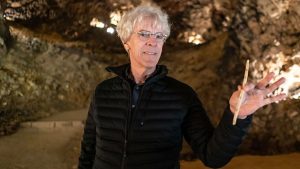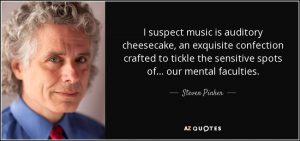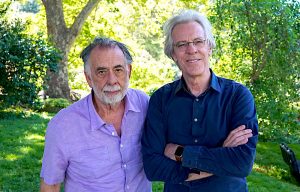
Copeland with world’s oldest known musical instrument, a bone flute.
![]()
Finally got around to watching Stewart Copeland’s Adventures in Music today.
I’d had lunch with my mum, and she mentioned watching it. Had I? She and husband Malcolm said they’d liked it, but not been blown away by it. They’d liked each episode more; sceptical about the first, etc. And a pal, John Morgan, was raving – or should I say singing it’s praises? – about it on Facebook.
So I binge watched all three episodes today. First off, as a drummer who loved and was influenced by Copeland as a teenager, I just enjoyed watching him enthuse about music, a subject I share his fascination for.
Structurally, I seem to have had the reverse experience to my mum and her husband. I liked episode one enormously, and two built on that. But three – as good as it still was – lost me a little, as it seemed to become less analytical, in particular in relation to the religious connections he was exploring, and the (for me, at least) vexed subject of ‘spirituality’.


Funnily enough, earlier in the day I’d been listening to Frank Zappa, and one song that came on and really struck a chord with me was Cosmick Debris, in which the singer takes to task a new age type bullshit peddler. In the final episode of Copeland’s series, when gospel star CeCe Winan says ‘music was created by God… I don’t know if any of us can really articulate how this [the ‘transcendent’ effect] happens, except that God made it happen’, I’m thinking, er… no… that’s a typical religious explanation: you can’t explain something, and so, for you, God fills in those gaps. Like Zappa, I’m not buying that junk.
That I don’t agree with what I deem to be simple-minded religious zealotry is no surprise for me. But someone else who kind of came a bit of a surprise cropper was Stephen Pinker, with his ‘cheesecake’ angle. As a rationalist/humanist, I believe I share certain many aspects of Pinker’s approach/worldview. But, like Stewart, I’m kind of nonplussed by this. Maybe Pinker’s just got a tin ear? Or is otherwise missing something?

Plenty of other scientists, numerous even in similar areas to Pinker’s own field of expertise, including some who appeared here (Dr Nicholas Connard, Daniel Levitin, and others), think otherwise. Some, for example, and I can tell Copeland likes this idea (as do I), believe that music predates and maybe even helped create language. From this perspective it cannot be dismissed as mere cheesecake.
The series is overwhelmingly positive in tone, which is no bad thing. But it does mean that some areas, areas that might’ve benefitted from deeper exploration – had this been commissioned in the Attenborough at the helm era of BBC2, it might have been a 13 part sledgehammer! – are glossed over way too briefly and simplistically.


One of these relates to how as we grow in age and experience, our identification with certain types of music evolves. Hearing simply that we love music, and we especially love it in groups (not an exact quote, but a simplification of a recurrent theme) left me wondering why for me this is not really the case. Certain kinds of music are anathema to me, frankly. And I know it has a lot to do with what they signify to me regarding belonging (or not) to certain groups.
Still, all in all, this was a good series. Too short, perhaps, and maybe even a little too personality driven [1] and ‘lite’. But very good nonetheless. Lots in there to enjoy. Lots to think on.
NOTES:
[1] Copeland nearly always seems borderline manic, and his effervescent energy bubbles away throughout the series. At times you can see him consciously reining it in. Whilst occasionally it bubbles over in a less controlled manner. Sometimes this is great. But occasionally one senses it masks or precludes other possibilities… if you know what I mean?
